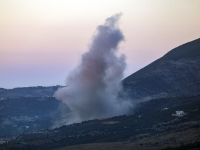UN Secretary General Kofi Annan exhorted the Security Council on Wednesday, February 28, to find common ground on Iraqi sanctions before he holds a second round of talks with Iraqi officials.
Annan said the Iraqis put forward no concrete proposals during a two-day meeting early this week, but said "the second round should be expected to go into details".
Annan was speaking to reporters after briefing the council on his talks with an Iraqi delegation led by Iraqi Foreign Minister Mohammad Said Al-Sahhaf. They agreed to meet again in mid-April or early May.
The talks were the first high-level contact between the two sides since December 1998, when UN arms inspectors left Iraq for the last time, and Annan said the Iraqis "stated their grievances, or the facts as they perceive them".
He said the Iraqis had three key priorities: the no-fly zones enforced against them by Britain and the United States; disarmament; and economic sanctions.
The UN imposed sanctions on Iraq in August 1990 after it invaded Kuwait, later insisting Iraq remove all its weapons of mass destruction as a condition for removing the embargo.
The no-fly zones — which do not have UN approval — are one of several points of contention between the five permanent members of the Security Council. The five are also divided over the effectiveness of the sanctions, with France, China and Russia preferring to see them suspended rapidly.
Annan said he told the Iraqis of "the need to comply with the resolutions and the expectations of the Security Council". But he added there was "a need for the council to agree on certain critical questions, and to restore the unity of the council."
Al-Sahhaf gave no sign Baghdad was willing to discuss compromises. Instead, he said Iraq had fulfilled all the disarmament obligations placed upon it by the UN, and he insisted sanctions be unconditionally and immediately lifted.
Al-Sahhaf stressed the council had left Iraq largely defenseless and said the arms inspectors would only be allowed to return in the context of regional disarmament.
Noting Resolution 687 referred to the goal of establishing in the Middle East a zone free from weapons of mass destruction and all missiles for their delivery, the Iraqi envoy said inspectors should start with Israel, which was an atomic power.
The British ambassador to the United Nations, Jeremy Greenstock, told reporters "this is an aspiration, but it is a very difficult aspiration." The council was not omnipotent, he said, and had to "focus on the Iraqis aspects first because that is where there is a real security threat."
Greenstock acknowledged there was "huge debate and controversy about the means by which we try to reach the end goal" of verifying that Iraq had disarmed. But, he said, there was no disagreement between council members that security in the Gulf and the threat posed by Iraq to its neighbors were "the primary responsibility of the council."
Neither did anyone disagree that Iraq could not be taken at its word, he said. "There has to be verification, there has to be monitoring and there has to be inspection on the ground," he said.
But Greenstock said there were very complex issues to be resolved, and he added: "Expect this to be quite a long haul, and no big headlines from one day to the next." — (AFP, UN)
© Agence France Presse 2001
© 2001 Mena Report (www.menareport.com)







